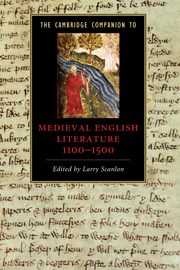Book contents
- Frontmatter
- Introduction
- Part I Contexts, genres, and traditions
- 1 Re-inventing the vernacular: Middle English language and its literature
- 2 Textual production and textual communities
- 3 Religious writing: hagiography, pastoralia, devotional and contemplative works
- 4 Romance
- 5 Dialogue, debate, and dream vision
- 6 Drama
- 7 Lyric
- 8 Lollard writings
- Part II Authors
- Guide to further reading
- Index
5 - Dialogue, debate, and dream vision
from Part I - Contexts, genres, and traditions
Published online by Cambridge University Press: 28 November 2009
- Frontmatter
- Introduction
- Part I Contexts, genres, and traditions
- 1 Re-inventing the vernacular: Middle English language and its literature
- 2 Textual production and textual communities
- 3 Religious writing: hagiography, pastoralia, devotional and contemplative works
- 4 Romance
- 5 Dialogue, debate, and dream vision
- 6 Drama
- 7 Lyric
- 8 Lollard writings
- Part II Authors
- Guide to further reading
- Index
Summary
A remarkable number of Middle English works (usually poems) take the form of debate or dialogue; many, too, are framed as dreams. While we may define two distinct genres of Middle English literature - the debate/dialogue and the dream vision - often the two are merged in a single work, with extended debates or dialogues depicted as occurring within a first-person narrator's dream. Indeed, the composite genre of dream-debate/dialogue constitutes one of the most widely used forms in Middle English literature, with a number of the great canonical poems of the fourteenth century - Pearl, William Langland's Piers Plowman, Geoffrey Chaucer's Book of the Duchess, House of Fame, Parliament of Fowls, and Prologue to the Legend of Good Women - being both framed as dream visions and structured around a central dialogue or series of dialogues. In addition, John Gower's Confessio Amantis, while not explicitly a dream, shares many of the generic characteristics of the dream vision. Many other Middle English texts also represent debates, dreams, and intersecting dream-debates. The brilliant bird-debate The Owl and the Nightingale is usually dated to the end of the twelfth century. Debates between the body and the soul appear in the twelfth and thirteenth centuries, continuing an Old English tradition that extends as well into the Renaissance. Alongside the poems just mentioned, the fourteenth century also produced such alliterative dream-debates as Winner and Waster, The Parliament of the Three Ages, and Thomas Usk's prose Testament of Love.
- Type
- Chapter
- Information
- Publisher: Cambridge University PressPrint publication year: 2009
- 1
- Cited by



